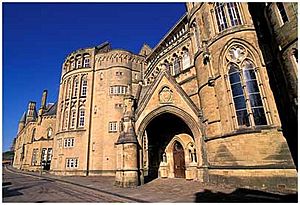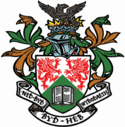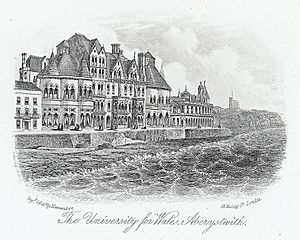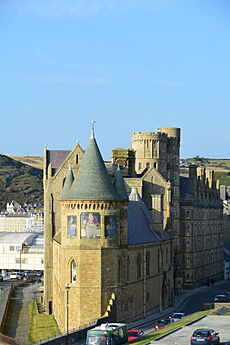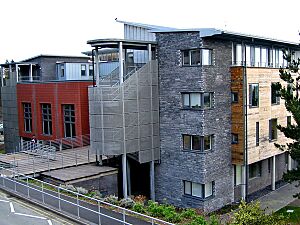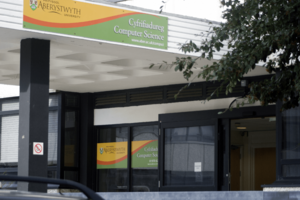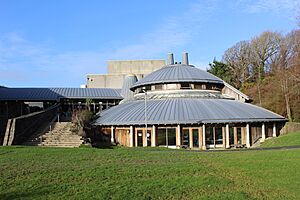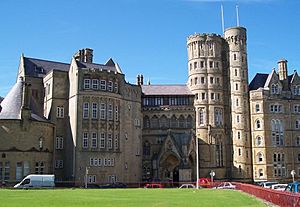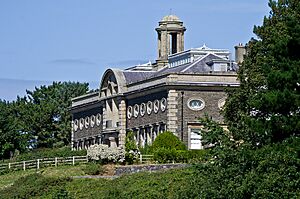Aberystwyth University facts for kids
|
Prifysgol Aberystwyth
|
|||||||||||||
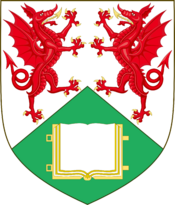 |
|||||||||||||
|
Former names
|
University of Wales, Aberystwyth | ||||||||||||
|---|---|---|---|---|---|---|---|---|---|---|---|---|---|
| Motto | Welsh: Nid Byd, Byd Heb Wybodaeth | ||||||||||||
|
Motto in English
|
A world without knowledge is no world at all | ||||||||||||
| Type | Public | ||||||||||||
| Established | 1872 (as The University College of Wales) | ||||||||||||
| Endowment | £33.5 million (2023) | ||||||||||||
| Budget | £130.8 million (2022/23) | ||||||||||||
| Chancellor | Nicola Davies | ||||||||||||
| Vice-Chancellor | Jon Timmis | ||||||||||||
|
Academic staff
|
700 (2021/22) | ||||||||||||
|
Administrative staff
|
1,100 (2021/22) | ||||||||||||
| Students | (2022/23) | ||||||||||||
| Undergraduates | (2022/23) | ||||||||||||
| Postgraduates | (2022/23) | ||||||||||||
| Location | , | ||||||||||||
| Campus | Campus, 1,709 hectares (4,220 acres) | ||||||||||||
| Colours |
|
||||||||||||
| Affiliations |
|
||||||||||||
 |
|||||||||||||
Aberystwyth University (Welsh: Prifysgol Aberystwyth) is a public research university in Aberystwyth, Wales. It was one of the first universities to join the former federal University of Wales. Today, over 8,000 students study here. They are spread across three main academic areas and 17 departments.
The university started in 1872 as University College Wales, Aberystwyth. In 1894, it became a founding member of the University of Wales. Its name changed a few times over the years. On September 1, 2007, Aberystwyth University became an independent university again.
Contents
Discovering Aberystwyth University's Past
In the mid-1800s, important people in Wales wanted to create a university. They believed it was important for Welsh students to have a place to learn. One key person was Thomas Nicholas. His book in 1863 greatly influenced many educated Welsh people.
The university opened in October 1872 with only 26 students. It was funded by donations from people and groups. Thomas Charles Edwards was the first leader, called the principal. By 1875, over 70,000 people in Wales had donated money. Women were allowed to study here starting in 1884.
In 1885, a fire damaged the building now known as the Old College, Aberystwyth. Later, in 1897, the university bought land for its main campus, Penglais. In 1893, the university received a special royal charter. This made it an official university.
The university's coat of arms was created in the 1880s. It shows two red dragons, which are symbols of Wales. An open book represents learning. The eagle or phoenix above a flaming tower might show the university's new start after the 1885 fire. The motto is in Welsh: Nid Byd, Byd Heb Wybodaeth. This means 'a world without knowledge is no world at all'.
In the early 1900s, the university added new subjects like law and mathematics. The Department of International Politics started in 1919. Aberystwyth says it is the oldest department of its kind in the world. By 1977, many top scientists worked at the university. This included Gwendolen Rees, the first Welsh woman to become a FRS.
The Department of Sports and Exercise Science began in 2000. Psychology degrees were added in 2007 and 2009. The university celebrated its 150th birthday in 2022.
What You Can Study
The university has many different subjects to choose from. These are organized into three main groups, called faculties.
Arts and Social Sciences
This faculty includes subjects like:
- Art
- Education
- English and Creative Writing
- History and Welsh History
- International Politics
- Law and Criminology
- Modern Languages
- Theatre, Film and Television Studies
- Welsh and Celtic Studies
International Politics Department
This department is the oldest of its kind in the world. It started in 1919 after the First World War. Its goal was to help people understand the world better. This was hoped to prevent future conflicts. The department has over 700 students from many countries.
Law and Criminology Department
The Department of Law and Criminology started in 1901. It is located in the Hugh Owen Building. This department also has a special research center for Welsh legal matters.
Modern Languages Department
Aberystwyth has taught modern languages since 1874. You can learn French, German, Italian, and Spanish. Courses are available for both beginners and advanced students.
Business and Physical Sciences
This faculty offers subjects such as:
- Business
- Computer Science
- Information Studies
- Mathematics
- Physics
Computer Science Department
The Department of Computer Science started in 1970. It does research in areas like AI and robotics. A student from this department, Alan Cox, created AberMUD. This was one of the first popular online multiplayer games. Another graduate, Jan Pinkava, won an Oscar for his animated film Geri's Game.
Physics Department
Physics was first taught at Aberystwyth in the 1870s. The department became official in 1877. Early research focused on electricity and quantum theory. Later, it moved into areas like air density and radar.
Earth and Life Sciences
This faculty includes:
- Biological, Environmental and Rural Sciences (IBERS)
- Geography and Earth Sciences
- Psychology
Institute of Biological, Environmental and Rural Sciences (IBERS)
IBERS is a research and teaching center. It brings together experts in biology and environmental science. About 360 staff work here, doing research in many areas of biology.
Geography and Earth Sciences Department
This department was formed in 1989. It has a large map library with 80,000 maps.
Psychology Department
Psychology became a department in 2007. It is located on the Penglais Campus. The department has over 550 undergraduate students. Its degrees are approved by the British Psychological Society.
University Campuses
Aberystwyth University has several campuses. Each one offers different facilities and learning environments.
Penglais Campus
This is the main campus. It sits on Penglais Hill, looking over Aberystwyth town and Cardigan Bay. Most university buildings, the Arts Centre, and student homes are here. The National Library of Wales is also nearby. The campus gardens are very special and are listed as historically important.
Llanbadarn Centre
The Llanbadarn Centre is about a mile east of Penglais Campus. It used to host the Business and Law Schools. The Department of Information Studies is still based here.
Gogerddan Campus
This campus is on the edge of town. It is the main center for research in land-based sciences. It is home to the Institute of Biological, Environmental and Rural Science.
School of Art, Edward Davies Building
The School of Art is in the Edward Davies Building. This building is known for its beautiful architecture.
Old College
This is the university's original building. There is a project called "New Life for Old College." It aims to turn it into a center for heritage, culture, and learning.
Student Homes
Most student homes are on campus. Others are a short walk away. There are different types of rooms. These range from traditional halls with meals to modern apartments. All rooms have internet access.
Penglais Campus Homes
- Cwrt Mawr: Self-catered flats for over 500 students.
- Neuadd Pantycelyn: A Welsh-speaking hall with meals, renovated in 2020.
- Penbryn: Another Welsh-speaking hall with meals.
- Rosser: Self-catered flats with private bathrooms.
- Trefloyne: Self-catered flats.
Pentre Jane Morgan (Student Village)
This area has almost 200 individual houses. Each house usually has five or six students. It can house over 1,000 students in total.
Fferm Penglais Student Residence
This is a modern building with studio apartments and private bedrooms. It can house 1,000 students. There is a special area for Welsh learners or fluent Welsh speakers.
Town Homes
- Seafront Residences: Self-catered flats located by the sea. These include Aberglasney, Balmoral, and Ty Glyndwr.
University's Achievements
| National rankings | |
|---|---|
| Complete (2021) | 45 |
| Guardian (2021) | 66 |
| Times / Sunday Times (2021) | 48 |
| Global rankings | |
| QS (2021) |
741–750 |
| THE (2021) | 601–800 |
| British Government assessment | |
| Teaching Excellence Framework | Gold |
Aberystwyth University is often ranked among the top universities in the UK. It was named "University of the year for teaching quality" for two years in a row (2018 and 2019).
In 2016, students rated Aberystwyth University very highly for overall satisfaction. The university has also received awards for promoting women's careers in science and engineering.
The university has worked to improve its environmental efforts. In 2014, it received an EcoCampus Silver Phase award. In 2015, the Penglais Campus received the Green Flag Award. This award recognizes high-quality parks and green spaces.
Important People at Aberystwyth
Many important people have been part of Aberystwyth University.
Leaders of the University
- Presidents and Chancellors: These are important leaders of the university. Past chancellors include Henry Austin Bruce, 1st Baron Aberdare and John Thomas, Baron Thomas of Cwmgiedd. The current chancellor is Nicola Davies (judge).
- Principals and Vice-Chancellors: These people manage the university day-to-day. Past vice-chancellors include Thomas Charles Edwards and Elizabeth Treasure. The current vice-chancellor is Jon Timmis.
Famous Teachers
Many well-known academics have taught at Aberystwyth.
- E. H. Carr: A famous historian and professor of International Politics.
- F. Gwendolen Rees: A professor of Zoology and a Fellow of the Royal Society.
- Joseph Parry: A professor of Music and a composer.
- T. H. Parry-Williams: A poet and professor of Welsh.
Notable Alumni
Many students who studied at Aberystwyth have gone on to do amazing things.
Royalty
- Charles III: The King of the United Kingdom.
- Tunku Muhriz: The Grand Ruler of Negeri Sembilan, Malaysia.
Academia
- Alan Cox: A programmer who contributed to the Linux kernel.
- Frederick Soddy: A Nobel Prize winner in Chemistry (1921).
- Sir John Meurig Thomas: A famous chemist and professor.
Law
- Elwyn, Lord Elwyn-Jones: A former lord chancellor.
Politics
- Vaughan Gething: The First Minister of Wales in 2024.
- Carwyn Jones: A former First Minister of Wales (2009–2018).
- Liz Saville Roberts: A Plaid Cymru Member of Parliament.
Business
- Lance Batchelor: Former CEO of Domino's Pizza Group.
- Tom Singh: The founder and CEO of New Look stores.
Sports
- John Dawes: A famous Rugby player and captain for Wales.
- Angela Tooby: A silver medalist in the World Cross-Country Championships.
Arts and Entertainment
- Alex Jones: A presenter on the BBC One TV show The One Show.
- Jan Pinkava: An Oscar-winning animated film director.
- Rachel Roberts: A well-known actress.
Journalism
- Gareth Jones: A journalist who reported on the famine in Ukraine.
Images for kids
See also
 In Spanish: Universidad de Aberystwyth para niños
In Spanish: Universidad de Aberystwyth para niños
- Aberystwyth Arts Centre
- List of universities in the United Kingdom
- List of universities in Wales
- Thomas Parry Library


